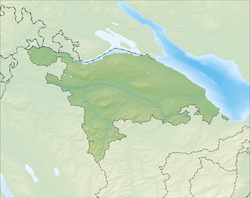Gottlieben
| Gottlieben | |
|---|---|
 |
|
| Coordinates: 47°40′N 9°8′E / 47.667°N 9.133°ECoordinates: 47°40′N 9°8′E / 47.667°N 9.133°E | |
| Country | Switzerland |
| Canton | Thurgau |
| District | Kreuzlingen |
| Area | |
| • Total | 0.33 km2 (0.13 sq mi) |
| Elevation | 400 m (1,300 ft) |
| Population (Dec 2015) | |
| • Total | 325 |
| • Density | 980/km2 (2,600/sq mi) |
| Postal code | 8274 |
| SFOS number | 4651 |
| Surrounded by | Constance (Konstanz) (DE-BW), Ermatingen, Reichenau (DE-BW), Tägerwilen |
| Website |
www SFSO statistics |
Gottlieben is a municipality in the district of Kreuzlingen in the canton of Thurgau in Switzerland.
Gottlieben is first mentioned around the end of the 10th century as Gotiliubon. It was originally part of the land owned by the Bishop of Constance. In 1251, Eberhard von Waldburg built a castle that served as the residence of the Bishops. After the Swabian War in 1499 the episcopal chief constable managed the village and the local low court from the castle until 1798. The court included Engwilen, Siegershausen and Tägerwilen as well as Gottlieben and made up the Bishop's bailiwick of Gottlieben. In 1808 the castle became private property. In 1837 it was renovated in a neo-gothic style.
Originally Gottlieben was in the parish of Tägerwilen. During the Protestant Reformation (1529) the population converted to the new faith. In 1734-35, the church was built and the Swiss Reformed Church parish of Gottlieben was formed. Since 1912, this parish has been combined with Tägerwilen.
In the 17th and 18th centuries the village witnessed an economic boom because of its convenient location for Rhine traffic. It became a commercial and trading center for salt, iron and wine. In 1678 it received market rights. Although in the 19th Century small industries settled in Gottlieben (the button factory, horsehair spinning), until after the mid-20th Century fishing, crafts and trade formed the main occupation of the population. After 1945, tourism developed into the main industry of the village, so that today only two boat yards and the famous restaurant Hüppenbäckerei remain. In 2000 the Bodman-Haus, the former home of the poet Emanuel von Bodman (1874–1946), opened a memorial and cultural center.
...
Wikipedia



